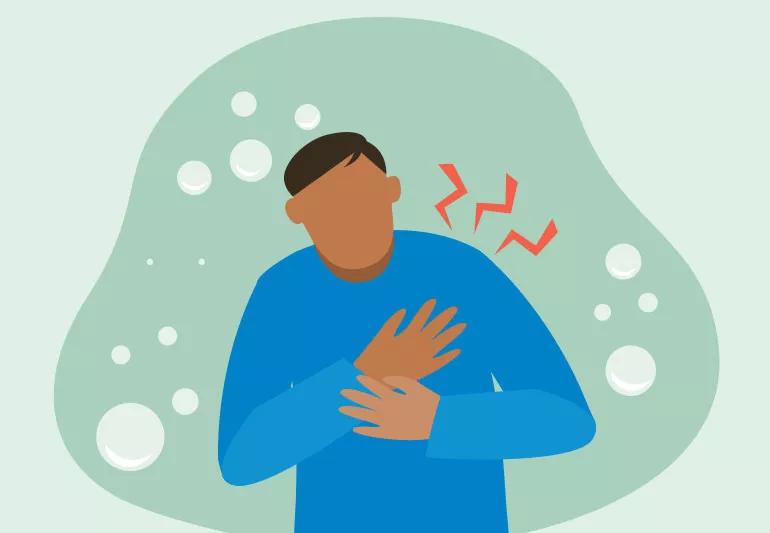When it can’t pass down south, gas can definitely travel — and get trapped — up north

Image content: This image is available to view online.
View image online (https://assets.clevelandclinic.org/transform/9313744a-65d0-4579-b71c-4d87b155669d/chest-Pain-gas1-1330603241-770x533-1_jpg)
person clutching chest
The short answer is yes.
Advertisement
Cleveland Clinic is a non-profit academic medical center. Advertising on our site helps support our mission. We do not endorse non-Cleveland Clinic products or services. Policy
When it’s trapped in your upper abdomen, backed-up intestinal gas can cause intense chest pain. In fact, some people may wonder if they’re having a heart attack and not just needing to fart.
Fortunately, while chest pain can signal a real emergency, there are ways to tell the difference, as well as options for finding relief.
Gastroenterologist Christine Lee, MD, offers some guidance.
On the long and winding road that is your digestive system, there are only two spots where gas can get out. When it sneaks out of the southern port, we call it a fart. When it heads up north, that’s a burp or a belch.
It’s all part of the digestive process, and it generally proceeds without much fuss.
But that’s not always the case. Sometimes, that gas gets trapped, says Dr. Lee, “And if, for whatever reason, you haven’t been able to pass it from below, it can travel north and end up as chest discomfort.”
Every person’s experience of pain can be different, notes Dr. Lee. That makes it hard to say with certainty how gas pain might feel to you.
With that warning in mind, common signs of gas accumulation in your chest might include:
Advertisement
Most times, gas pains occur in response to something you ate or drank, like:
Other potential causes of gas pains include medical conditions like:
Most times, chest pains caused by gas from something you ate or drank occur post eating or drinking, and burping or farting bring immediate relief.
A heart attack, on the other hand, is a lot more serious. But, again, because everyone experiences pain differently, it can be very hard to tell the difference between the two.
Here are some of the “early warning” signs of a heart attack — but beware: Heart attack signs can vary widely, from crushing pain to no pain at all:
If you think you might be having a heart attack, call 911 for immediate medical attention.
In fact, any time you experience chest pain, states Dr. Lee, caution must prevail. “I can give you the textbook description of a heart attack, but unfortunately, that’s not always the norm. Some people have no pain with a heart attack. Others, say, might just feel a tingling in their left arm.
“So, if a cardiology textbook can’t explain chest pain for everyone, there is no way to explain gas pain for everyone — because what feels like gas pain to one person might feel like a heart attack to another.”
The most direct way to relieve trapped gas is to let it out, by way of burping or farting.
Try one or more of these tips to encourage the gas to move on:
Advertisement
To reduce the chances of excess gas buildup and future bouts of gas pain, consider these tips:
Dr. Lee says it comes down to this: “Prevention is always easier than treatment.”
Whether your chest pain is a sign of heart disease, the result of colorectal cancer or just because you ate too much broccoli, she recommends a prompt conversation with your healthcare provider.
Advertisement
“I’m very conservative,” she continues, “but the sooner you get a diagnosis for what’s causing your pain, the more options you have. The earlier the diagnosis, the easier it is to treat, or even to cure, the problem. But if you wait too long, you might no longer be able to cure it — you might just have to concentrate on not letting things get worse.”
Advertisement

Sign up for our Health Essentials emails for expert guidance on nutrition, fitness, sleep, skin care and more.
Learn more about our editorial process.
Advertisement
Fiber gets credit, but don’t let the byproduct keep you from enjoying beans
Excessive flatulence could indicate a digestive issue
Try these tips and tricks to help your baby get rid of gas fast
Certain foods, medications or even illness could be behind the stink
To help determine what you’re experiencing, focus on how the pain feels, the location of the pain, when it started and how long it lasts
It’s perfectly normal for gas pockets to ‘evacuate’ during the motions of sex
Don’t ignore chest pressure that lingers and can’t be explained
Most chest pain in kids isn’t worrisome, but there are some symptoms that deserve attention
Type 2 diabetes isn’t inevitable with these dietary changes
Applying a hot or cold compress can help with pain
Pump up your iron intake with foods like tuna, tofu and turkey